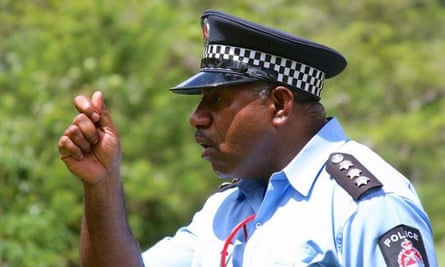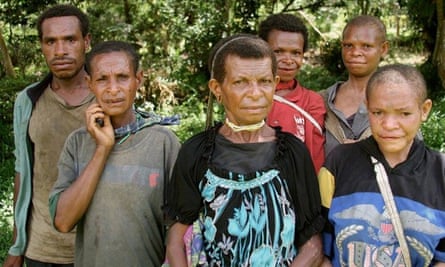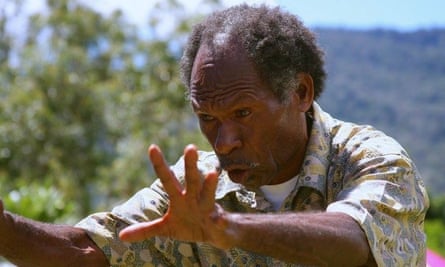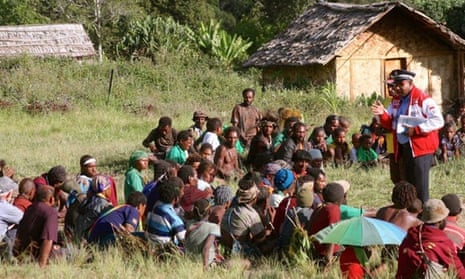A recent intervention preventing the murder of four women accused of sorcery is being hailed as a victory in the push to eradicate witchcraft-related attacks in Papua New Guinea, but those fighting the battle say the violence is still increasing.
After a measles outbreak killed several people in Enga province last year, four women were accused of bringing it upon the remote community with witchcraft, leaving them and their families in danger of being killed. Last week the ABC reported police and missionaries led an intervention to save the women, and claim they successfully talked local people around.
The Enga deputy police commander, Epenes Nili, told Guardian Australia he and a delegation flew into the village where the women had been confined.
“There we met four women who called themselves [fortune tellers] – they were already there to receive us,” said Nili. “We sat all of the [villagers] down and we told them what the fortune tellers said was all lies, and to squeeze money.”
Nili said they explained the laws and new punishments associated with the violence they had planned and church leaders spoke about Christianity.
“In their own custom when they turn over a stone it means they will not say these things again or not do these things again. In front of us they turned a huge stone and stood on top of it.”
He said members of the community who would normally take up the role of executioner broke their weapons in front of the delegation as a symbolic and practical gesture.
Violence against women is routinely described as an “epidemic” in PNG, and summary acts of retribution for perceived acts of witchcraft play a significant role. Belief in the supernatural powers of witches and sorcerers is entrenched in parts of the diverse and largely tribal country. A law which provided a defence to violence if it was done to “stop witchcraft” was only repealed in 2013.
Amnesty International described the move as one step forward and several steps back, as on the same day the government also expanded the death penalty to a wider range of crimes – including the murder of an accused sorcerer – indicating they may resume executions.
Associate professor Richard Eves, from the state society and governance in Melanesia program at ANU, described the repeal as a “kneejerk response” and said the issue of sorcery violence has been largely ignored. While the government has made some efforts, the work to combat gender-based violence is often left to church groups and NGOs.
Improvements in the health system, education and a better law and order response are all needed, Eves told Guardian Australia.

“My response [to the Enga intervention] is it’s a good thing that it’s happened but when you look at the police response to the very important case in 2013 of a woman who was burned in Mount Hagen – nobody has been prosecuted over that yet.”
20-year-old Kepari Leniata was stripped, doused in petrol and burned alive after she was accused of sorcery over the death of a young boy from illness. Two people were charged but there has been no conviction.
“Many police subscribe to the views that sorcerers and witches get their just desserts,” Eves said. “You need to have really good human rights training with the police and really have to start trying to get at some of the cultural underlying belief in sorcery and witchcraft. The Catholic church in Chimbu province has quite a good response – when somebody dies they are quickly on the scene, and start talking about alternatives.”
Father Philip Gibbs is based in Mount Hagen in PNG’s Western Highlands province, which shares a border with Chimbu. He has taken a “particular interest” in working to combat sorcery-related violence, both in rescuing people and raising awareness among communities.
Often when he arrives at a town or village after hearing a person is has been accused of sorcery, he faces strong resistance.

“I went to one place recently and … I wanted to speak to a woman who’d been tortured and they said no. There had been all sorts of intertribal tensions and they thought my presence would exacerbate those tensions. Where my coming might make that worse I have to really decide what’s best to do. If someone’s going to die out of it you have to intervene, but sometimes you can’t.”
There has been some “patchy” progress made in combatting sorcery-related violence, Gibbs believes, but it predates government efforts. Anecdotally, there seem to be fewer accusations in neighbouring Chimbu province after the Catholic church initiated a plan, he said.
“On the other hand I’ve seen a growth into areas where it wasn’t there before. I think there is a net increase at the moment.”
Others have also noticed an increase in sorcery accusations.
Gibbs puts the spread of the beliefs down to increasing rates of intermarriage and travel between regions.
“In Enga province, for example, there was no history of witchcraft,” he said, likening its arrival to a bushfire or a virus. “There’s no resistance.”
Gibbs runs workshops to educate people on the laws and problems associated with sorcery accusations.
“I help people become aware of things such as if there is talk of someone being a witch, was that person being tortured? From what I’ve seen in all cases when people admit it they are under incredible pressure – tyres being lined up next to them, the smell of petrol, heated knives. That needs to be pointed out to [people].”

As a priest, Gibbs’s work is obviously heavily based on Christian teachings, which also played a part in Enga as villagers were given Bibles and warned of the sins they planned to commit.
Both Christianity and local beliefs share aspects of spirituality, he said. “Christians talk about Satan and devils and so on, but I think I’d emphasise that Christian faith is there to help people have life and have a better life and to heal people.”
In other parts of the country some bishops have even gone so far as to threaten excommunication, the ABC reported this week.
For now, deputy commander Nili is confident the four women and their children in Enga are safe, and believes the region is at the beginning of a turning point.
“We are trying to get police officers to go into the jungle areas and to get the message [out] about sorcery belief. If the government can do quick intervention we think we can save many people.”

Comments (…)
Sign in or create your Guardian account to join the discussion